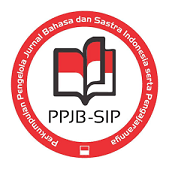SIKAP BAHASA SISWA PROGRAM CAMBRIDGE DYATMIKA SCHOOL TERHADAP BAHASA INDONESIA
DOI:
https://doi.org/10.23887/jjpbs.v3i1.5416Abstrak
Penelitian ini bertujuan mendeskripsikan sikap bahasa dilihat dari aspek(1) aspek konatif, (2) aspek afektif, (3) aspek kognitif, dan (4) faktor-faktor yang memengaruhi sikap bahasa siswa program Cambridge Dyatmika School. Untuk mencapai tujuan tersebut, peneliti menggunakan rancangan deskriptif kualitatif dan kuantitatif. Subjek penelitian ini adalah siswa program Cambridge. Pengumpulan data penelitian ini menggunakan metode observasi, angket, dan wawancara. Data dianalisis dengan menggunakan teknik deskriptif dengan menggunakan prosedur sebagai berikut (1) reduksi data, (2) penyajian data, dan (3) verifikasi. Hasil penelitian ini menunjukkan bahwa (1) Aspek konatif yang dimiliki oleh siswa Program Cambridge Dyatmika School berada pada kategori negatif. Aspek konatif yang negatif berkaitan dengan kesadaran siswa dalam menggunakan norma bahasa. Hal tersebut dilihat dari tingginya frekuensi pemakaian campur kode,alih kode,dan interferensi.(2) Aspek afektif yang dimiliki oleh siswa Program Cambridge Dyatmika School berada pada kategori sangat baik (sangat positif) jika dianalisis individu, sedangkan analisis secara klasikal berada pada kategori cukup.(3) Aspek kogntitif yang dimiliki oleh siswa Program Cambridge Dyatmika School terhadap bahasa Indonesia ada pada kategori positif. (4) Faktor-faktor yang memengaruhi siswa Program Cambridge Dyatmika School terhadap bahasa Indonesia dari aspek konatif disebabkan oleh kurangnya pemahaman siswa terhadap kosa kata dan kepekaan siswa, terkait dengan aspek afektif disebabkan oleh emosional siswa untuk mempertahankan bahasa Indonesia, dan faktor kognitif disebabkan oleh dua faktor yakni lingkungan dan rasa percaya diri siswa. Hal ini membuktikan bahwa pemahaman siswa dan kepekaan terhadap bahasa Indonesia perlu diberikan pembinaan dan motivasi.Kata Kunci : sikap bahasa, bahasa Indonesia, program cambridge.
This study has purpose in describing language attitudes view from aspect(1) conative aspect, (2) affective aspect, (3) cognitive aspect, and (4) factor which influence students’ language attitudes of Cambridge program in Dyatmika School. To achieve those purpose, the researcher used descriptive qualitative and descriptive quantitative design. The subject of this study is students who are in Cambridge program. In data collection, this study used observation method, questionnaire, and interview. The data were analyzed using descriptive technique by using procedures as follow (1) data reduction, (2) data presentation, and (3) verification. The result of this study shows that (1) conative aspect which is owned by the Cambridge program students in Dyatmika School are in negative category. Conative negative aspects related to the students' awareness in the use of language norms. It is seen from the high frequency of use of code-mixing, code switching, and interference. (2) Affective aspect which is owned by the Cambridge Program students in Dyatmika School are in the very good category (very positive) when analyzed individually, while the analysis is in the classical is in enough category. (3) Cognitive aspects which are owned by the Cambridge Program students in Dyatmika School to Indonesian language are on the positive category. (4) The factors that influence students of Cambridge Program in Dyatmika School to Indonesian language from conative aspect due to the lack of students' understanding of vocabulary and sensitivity of students, associated with affective aspects caused by students’ emotional in maintaining Indonesian language, and cognitive factors caused by two factors namely environmental factors and self-confidence of students. This proves that the students' understanding and sensitivity to Indonesian language should be given guidance and motivation.
keyword : language attitude, Indonesian language, Cambridge program
Diterbitkan
2015-07-23
Terbitan
Bagian
Articles
Lisensi
Authors who publish with the Jurnal Pendidikan Bahasa dan Sastra Indonesia Undiksha agree to the following terms:- Authors retain copyright and grant the journal the right of first publication with the work simultaneously licensed under a Creative Commons Attribution License (CC BY-SA 4.0) that allows others to share the work with an acknowledgment of the work's authorship and initial publication in this journal
- Authors are able to enter into separate, additional contractual arrangements for the non-exclusive distribution of the journal's published version of the work (e.g., post it to an institutional repository or publish it in a book), with an acknowledgment of its initial publication in this journal.
- Authors are permitted and encouraged to post their work online (e.g., in institutional repositories or on their website) prior to and during the submission process, as it can lead to productive exchanges, as well as earlier and greater citation of published work. (See The Effect of Open Access)







